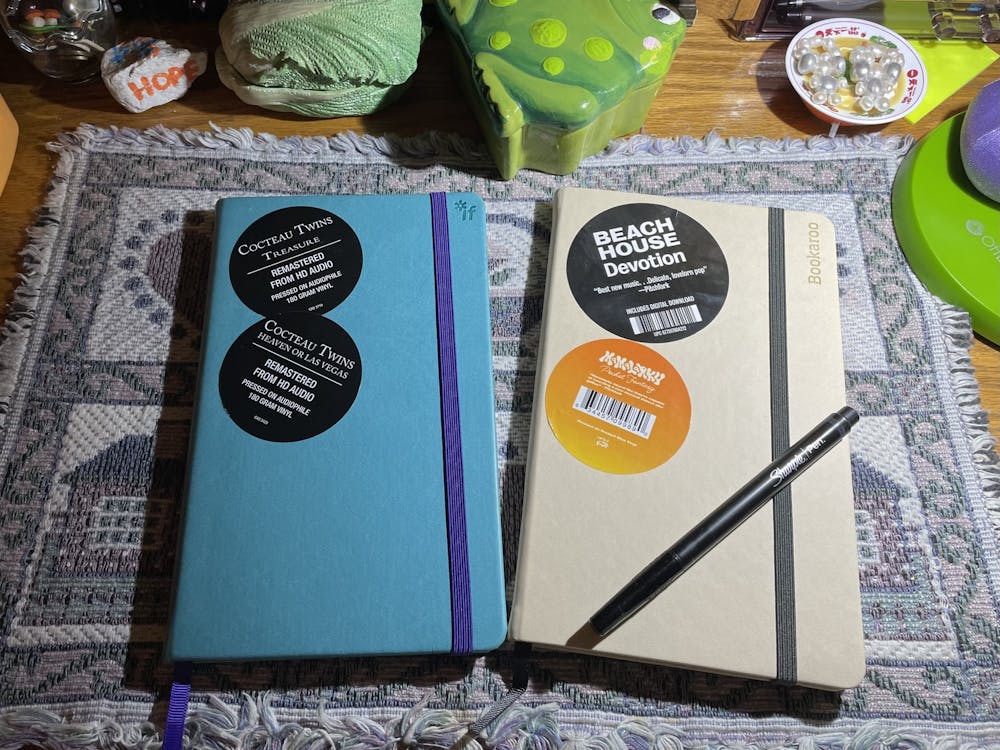Journaling has been a hobby of mine since the early days of middle school and has never failed to assist me in caring for my mental health. My main objective in journaling is to reflect on my experiences, feelings and self through deconstructing my thoughts and allowing my ideas to flow out onto the page as they come to me — there is no specific structure or “right way” to journal. I find there is nothing more soothing and rewarding than sitting down to reflect on the happenings of my day, week or month in my journal.
Life is eventful, and especially so for the average college student. However, the chaos of my schedule creates more of an incentive for me to carve out alone time with my journal. I’m able to control negative or worrisome thoughts that may spiral out of control, displaying the grounding function of my journal.
There are no limits to what may be added to a journal entry. Nothing is ever too small or unimportant, allowing me to record anything of relevance — an outfit I particularly like, the song stuck in my head, art projects in their present imaginative state or silly texts I receive. On that same note, I often write due to the mere presence of an undesirable feeling such as anxiety. I may reach a better understanding of outside factors contributing to my anxiety — relationships that aren’t working or a project I’m stressed out about — or even target a direct cause of such feelings from sources that remained undetected beforehand.
Compartmentalizing my feelings allows me to make connections between my perceived reality and self. I find personal reflections so insightful since I often construct a view of myself based on how other people may see me on the outside. My worldview depends largely on what I accept as the truth, so finding reason in my own perceptions and judgments is of the utmost importance to me.
When I write, I’m able to let go of any insecurities I hold, understanding that whatever I jot down stays between the jet-black ink of my pen and me. I don’t have to worry about any outside judgments permeating my ideas. I put pressure on myself daily to formulate insights that will impress my professors or exemplify proficiency in a topic. In contrast, journaling acts as a mechanism for me to produce a coherent stream of consciousness so I can then process whatever feelings I may be experiencing at the moment. I am able to ask myself difficult questions — why do I feel a certain way and how may I begin to effectively move past such feelings?
While journaling, I avoid implementing toxic positivity and excessive optimism into my thought processes. I think through situations acknowledging the presence and validity of my feelings, but sometimes I finish writing and feel the same as when I began — I can’t always maintain a positive attitude and that’s okay. There are a multitude of factors that could affect my state of mind, so the simple recognition of my feelings becomes helpful in itself. In this sense, journaling serves as an outlet for me to present thoughts that would otherwise remain stuck within the walls of my mind.
Journaling assists greatly with my mental health in these ways, but I also value capturing upbeat moments when I feel accomplished or fulfilled after making fun memories with friends. I love using my journal to capture moments that would otherwise be somewhat lost to the confounding principle of memory. I’ll often go back to read old journal entries and pick out minute details that I would never have remembered on my own.
One of the greatest lessons I’ve learned from my time spent journaling is that — through a better understanding of my own experiences— I’m able to see beyond myself. I acknowledge my own position by rationalizing my train of thought, which allows considerations of others to flow into my reflections. I often make unhealthy assumptions that are not plausible, sometimes to the extent that I question if my friends actually like me (we’ve all been there), but in reality, I am the only person giving traction to such thoughts. So, through journaling, I can acknowledge the validity of my feelings while at the same time transcending self-imagined problems that do not affect or define me.
Journaling has allowed me to reveal and accept parts of myself that would have otherwise remained hidden. I find the act of self-reflection through writing exceptionally beneficial, and I recommend journaling to anyone trying to better understand themselves. This is not a task that I pressure myself to take part in, but rather one I utilize as a tool. I write when I feel compelled to, and if I have a period where I don’t feel like writing, it’s okay. I take life as it comes, and I know that my journal will be there for me every step of the way.







